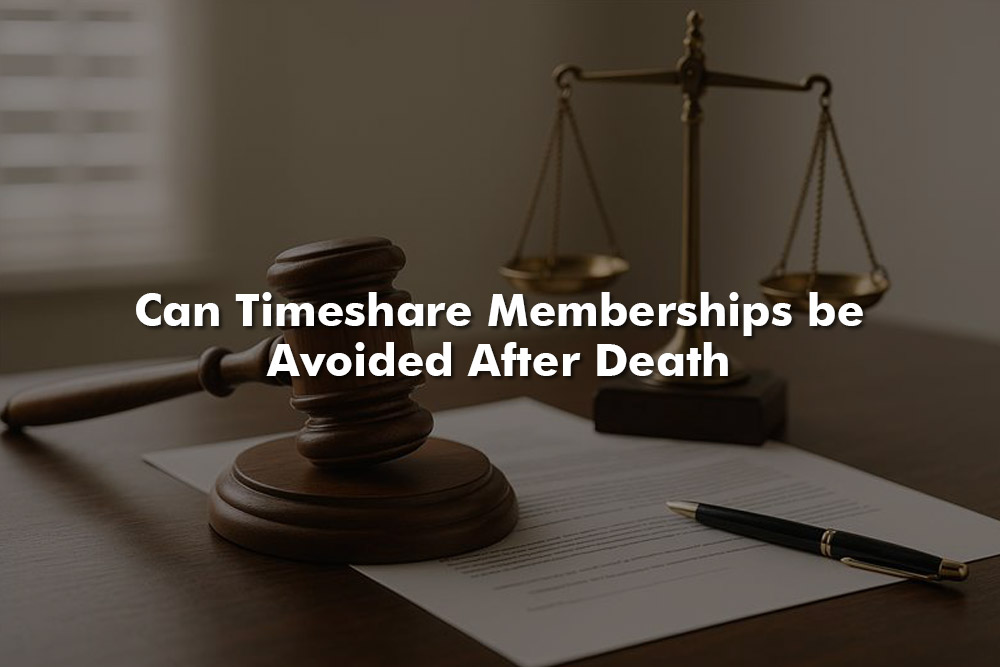Timeshares are often marketed as dream vacation opportunities, but when it comes to estate planning, they can quickly turn into a nightmare—especially for your heirs. Many people don’t realize that a timeshare membership can become an unwanted inheritance, complete with annual fees, special assessments, and legal headaches.
If you own a timeshare and want to spare your loved ones from inheriting this asset—or if you’re an heir unsure whether you must accept it—this article will help you understand your options.
At Allenby Law, we help San Diego families plan smarter by simplifying complex estate issues like timeshare ownership. Let’s break down whether timeshare memberships can be avoided after death and how to ensure your estate plan protects those you care about most.
The Nature of Timeshare Ownership
Before we explore how to avoid passing a timeshare to your heirs, it’s essential to understand what kind of ownership you have. Timeshares generally fall into two main categories:
Deeded Timeshare
This is a form of real property ownership. You legally own a fractional interest in the timeshare, and that interest becomes part of your estate when you pass away. A deeded timeshare behaves much like other real estate—it must go through probate (unless otherwise planned for) and can be transferred, inherited, or sold.
Right-to-Use (RTU) Timeshare
This is a lease-like agreement giving you the right to use the property for a certain number of years. You don’t own real property; you hold a contractual right. This type of timeshare may or may not be transferable, depending on the contract. RTUs may expire on a set date, or may require approval from the timeshare company to transfer to an heir.
Both types can impose ongoing maintenance fees and assessments, even after the owner’s death.
What Happens to a Timeshare After Death?
When a timeshare owner passes away, the timeshare becomes part of their estate—unless they’ve taken steps to remove it or transfer it before death. Here’s what typically happens:
- Deeded timeshares are treated as property and must go through probate unless placed in a trust or otherwise transferred.
- RTU timeshares may or may not require probate but can still trigger estate responsibilities depending on the contract.
Unless the estate planning documents clearly direct otherwise or the timeshare has been removed from the estate, the asset and its obligations can fall to the heirs.
Can Heirs Refuse a Timeshare?
Yes. In many cases, heirs can disclaim (i.e., legally refuse) an inheritance, including a timeshare. However, timing and process are crucial.
To successfully disclaim a timeshare:
- The refusal must be in writing and submitted within a specific time period, usually nine months after the decedent’s death.
- The person disclaiming must not have accepted any benefit from the asset before disclaiming (e.g., using the timeshare).
- Once disclaimed, the timeshare passes according to the next instruction in the estate plan or intestacy law.
It’s important to note that a disclaimer doesn’t stop the timeshare from going somewhere—it simply passes to the next named beneficiary, or eventually to the estate itself. If no one claims it, the executor may be forced to manage or liquidate the asset, and the estate may remain liable for fees in the meantime.
Steps You Can Take to Prevent Your Heirs from Inheriting a Timeshare
1. Speak to the Timeshare Company
Some timeshare developers or resort companies have take-back or exit programs—though not all promote them openly. If your timeshare is no longer serving your needs, reach out to see if the company offers:
- A deed-back program
- A formal exit process
- Recommendations for transfer assistance
If possible, resolve the ownership during your lifetime to avoid complications later.
2. Gift or Transfer the Timeshare Before Death
If there’s someone in your life who wants the timeshare, you can legally transfer or gift it while you’re still alive. This prevents it from being included in your estate and avoids probate issues.
However, make sure the recipient understands and accepts the ongoing financial responsibilities. A transfer is not effective unless the receiving party accepts the title or rights.
3. Sell the Timeshare (If Possible)
While many timeshares have little to no resale value, it’s worth investigating the secondary market or working with a reputable timeshare resale broker. Even if the sale doesn’t produce significant income, removing the asset before death can be beneficial.
Avoid timeshare resale scams by only working with licensed and transparent services. Never pay large upfront fees to sell your timeshare.
4. Include Clear Instructions in Your Estate Plan
If you must keep the timeshare, document your wishes clearly in your estate plan:
- Specify who (if anyone) should inherit the timeshare
- Provide a mechanism for disinheritance or disclaimer
- Identify successor beneficiaries or default transfer instructions
- Direct your executor to contact the resort for relinquishment if no heirs accept the asset
Using a revocable living trust can help avoid probate and give your trustee discretion in handling the timeshare efficiently and quickly.
What If the Estate Cannot Avoid the Timeshare?
Sometimes, despite best efforts, the estate may still be stuck with a timeshare. Here’s what typically happens:
- The executor becomes temporarily responsible for managing the asset.
- If no heirs accept it, the executor may attempt to sell or relinquish the timeshare on behalf of the estate.
- If the timeshare remains unwanted and unpaid, the resort company may foreclose on the property or terminate the contract.
In most cases, heirs are not personally liable for timeshare fees unless they’ve accepted the inheritance or used the property. The estate may still be charged fees until the asset is resolved.
What Not to Do
- Don’t ignore the timeshare: Failing to plan for it doesn’t make it disappear—it may burden your heirs or delay estate administration.
- Don’t assume someone will want it: Timeshares are rarely desirable assets in estate planning. Ask your heirs before making assumptions.
- Don’t rely solely on a will: A will may not be sufficient to avoid probate or transfer the asset efficiently, especially if the timeshare is in another state or country.
Work with an Experienced Estate Planning Attorney
Addressing a timeshare in your estate plan requires careful coordination of legal documents, contracts, and practical considerations. An experienced attorney can help you:
- Understand the contractual obligations tied to your timeshare
- Draft disclaimers and instructions to protect your heirs
- Explore exit options and title transfers
- Place the timeshare in a trust or remove it from your estate altogether
Smart planning today can spare your loved ones from stress, financial obligations, and legal confusion tomorrow.
How We Can Help
At Allenby Law, we take a smart and simplified approach to estate planning—helping San Diego families proactively manage all types of assets, including timeshares. If you’re unsure what to do with a timeshare in your estate, or if you want to ensure your loved ones are not stuck with unwanted financial burdens after your passing, we’re here to help.
We’ll work with you to evaluate your timeshare ownership, coordinate with your estate goals, and guide you through the best options—whether that’s transferring, selling, disclaiming, or structuring your estate to avoid complications.
Contact us today to schedule a personalized consultation and take control of your legacy.



